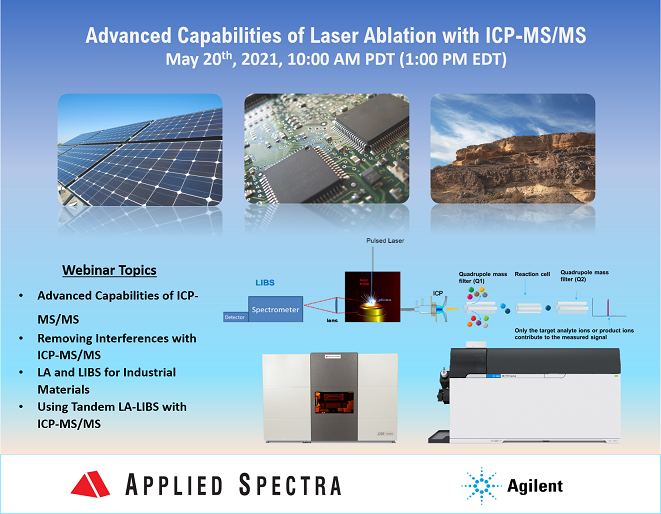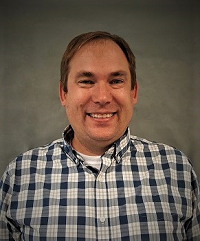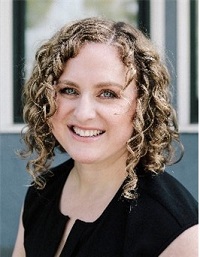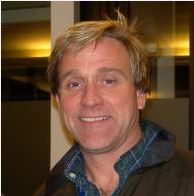Register for Our Second Joint Webinar by Applied Spectra and Agilent Technologies on the Advanced Capabilities of Laser Ablation with ICP-MS/MS

Webinar Topics:
Advanced Capabilities of Laser Ablation with ICP-MS/MS
Removing Interferences with ICP-MS/MS
LA and LIBS for Industrial Materials
Using Tandem LA-LIBS with ICP-MS/MS
Continuing in the series of technical webinars on the benefits of laser ablation with ICP-MS/MS, Applied Spectra and Agilent Technologies are pleased to announce our 2nd webinar on the Advanced Capabilities of Laser Ablation with ICP-MS/MS.
This webinar will highlight how Agilent 8900 ICP-MS/MS technology works in separating direct isobaric overlaps, using specific examples such as Rb-Sr, Hg, low level P and others. Utilizing the powerful mass selectivity of the first mass analyzer, control of the reactions (or collisions) in the collision reaction cell can now be carefully optimized, leading to improved interference removal and detection and new applications.
Using hands-on demonstrations using the Agilent 8900 coupled with the Applied Spectra Laser Ablation Instruments, we will also show how interference removal using the ICP-MS/MS technology can be applied to Laser ablation solid sampling. We will demonstrate direct solid sampling including spatial distribution and mapping capabilities for select industrial materials. By combining the power of the LA-ICP-MS and LIBS, the complete detection including C, H, O, N and F (by LIBS) along with the rest of the periodic table (by ICP-MS) is realized.
Webinar Date and Time
May 20th, 2021, Thursday, 10:00 AM PDT (1:00 PM EDT)
Webinar Presenters
Alan Koenig, Director of Global Application at Applied Spectra Inc.

Alan Koenig is the director of global application at Applied Spectra. Alan brings Applied Spectra 20+ years of LA-ICP-MS and instrument method development experience for a wide range of solid sample analysis. He has previously worked at the United States Geological Survey (USGS) where he ran the LA-ICP-MS Facility for 17 years.
He has published in a variety of journals including the Journal of Analytical Atomic Spectroscopy. Geology, American Mineralogist, Geoarchaeology, Economic Geology and numerous others. He has contributed significantly to the design and production of geological reference materials used for LA-ICP-MS and LIBS. Alan is also versed in other analytical techniques such as Raman (including Raman inside the LA system), micro-XRF, LIBS, SEM and electron beam techniques. Alan received his B.S. and M.S. in Geology from Colorado State University.
Dr. Jenny Nelson, Application Scientist at Agilent Technologies

Jenny Nelson received her Ph.D. in Analytical Chemistry from the University of Cincinnati in 2007, and her MBA from Saint Mary’s College of California in 2011. Currently, Jenny is an Application Scientist for the Life Science and Chemical Analysis team at Agilent Technologies, joining in 2012 (with a step away in 2019). Jenny is also an Adjunct Professor in the Department of Viticulture and Enology at the University of California, Davis, since 2013. Jenny has been very active with AOAC and ASTM over the past eight years, serving on expert review panels, chairing committees, and volunteering to develop new methods needed by the industry.
Jenny has extensive experience in operating and method development for Inductively Coupled Plasma Mass Spectroscopy (ICP-MS), Inductively Coupled Plasma Optical Emission Spectroscopy (ICP-OES), Microwave Plasma Atomic Emission Spectroscopy (MP-AES). Jenny has broad knowledge and experience in different speciation analysis for many sample matrices using GC-ICPMS and LC-ICPMS. As well as vast experience with sp-ICP-MS for many applications.
Craig Jones, Application Scientist at Agilent Technologies

Craig has been with Agilent for over 15 years as an ICP-MS applications scientist. He has been involved with multiple type of applications for ICP-MS, including environmental, pharmaceutical, semiconductor, geologic, and clinical analyses, to name a few. Previous to Agilent He worked in an environmental lab performing analysis and supervising both the inorganic and organic sections of the laboratory. In his spare time, Craig enjoys volunteering at the local marine science center, mountain biking, hiking and relaxing at the beach. Craig obtained a bachelor of science degree in chemistry from Fort Lewis College in Durango, CO.


